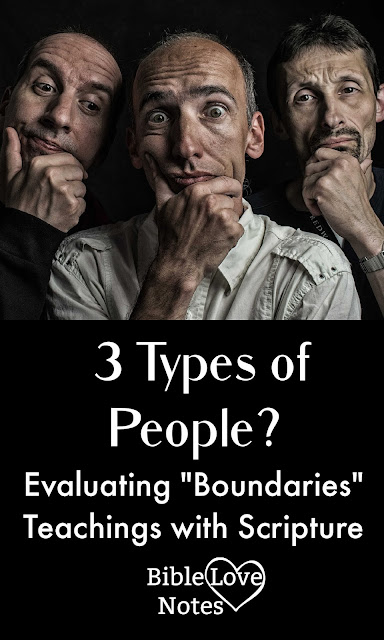Reviewing Boundaries website teachings and comparing them with Scripture.
For an introduction and review of the Boundaries online teachings, see Are Henry Cloud's Boundaries Teachings Biblical?
Because Boundaries presents itself as a Christian teaching, I've taken some time to examine a sampling of their articles and compare them to Scripture.
The article Wise, Foolish or Evil: How to Know Who You're Dealing With doesn't contain a single Scripture. It starts by telling us that we shouldn’t expect everyone to be “responsible and loving” like we are.
This is representative of Boundaries teachings which encourage us to think of others as our problem. Focusing on others with a superior attitude is further reinforced with statements like this: “The truth is that not many people take responsibility for themselves or care about how their actions are affecting other people or the mission.”
They go on to explain that we shouldn’t “waste time, money, energy, and resources” on unworthy people.
Next, the article claims that all people and behaviors fall into one of three categories: Wise, foolish, or evil.
The wise person learns wisdom from their experiences (no mention of God) and he/she accepts feedback, so “you will likely get your return on investment” if you deal with them.
The foolish person never accepts correction, so you need to set limits and “where appropriate, give consequences that will cause them to feel the pain of their choice not to listen.”
The evil person is only out to hurt you and you protect yourself at all expense “with lawyers, guns and money.” They also claim that an evil person will never change.
Their solution: “Whereas you talk to wise people about problems, and you talk to fools about consequences, do not talk to evil people at all, period.”
Is this biblical advice?
Scripture never defines three types of people, nor do we find only three types of people in our life experiences. With the exception of sociopaths, people are a mixture of good and bad.
Furthermore, when we become Christians, we admit that we ourselves are a mixture of good and bad. We seek to become less selfish and more forgiving. We invest in the people God tells us to invest in, such as parents (Ephesians 6:2), fellow believers (Philippians 2:1-5), and unsaved friends and neighbors (Matthew 28:19).
If we are a board of elders, a parent of underage children, or an employer we may need to give consequences to church members, our children, or our employees for inappropriate behavior. But that is not our job with other people.
Romans 12 is a chapter full of advice about relationships. Let me share a few of the verses and ask you to compare them with the advice in the Boundaries article:
“Be devoted to one another in love. Honor one another above yourselves... Be joyful in hope, patient in affliction, faithful in prayer…Bless those who persecute you; bless and do not curse. Rejoice with those who rejoice; mourn with those who mourn. Live in harmony with one another. Do not be proud, but be willing to associate with people of low position. Do not be conceited. Do not repay anyone evil for evil. Be careful to do what is right in the eyes of everyone. If it is possible, as far as it depends on you, live at peace with everyone. Do not take revenge, my dear friends, but leave room for God’s wrath, for it is written: ‘It is mine to avenge; I will repay,’ says the Lord. On the contrary: ‘If your enemy is hungry, feed him; if he is thirsty, give him something to drink. In doing this, you will heap burning coals on his head.’ Do not be overcome by evil, but overcome evil with good.”
Boundaries or Bible? I believe the Bible has the answers for our relationship problems. What do you believe?
Note: There may be times that we need to apply guidelines in our relationships, but guidelines do not go as far as boundaries. See Boundaries versus Guidelines.
For a collection of helpful articles about specific Boundaries errors in their teachings about marriage, family, and church relationships, see Are Boundaries Biblical Collection.




No comments:
Post a Comment